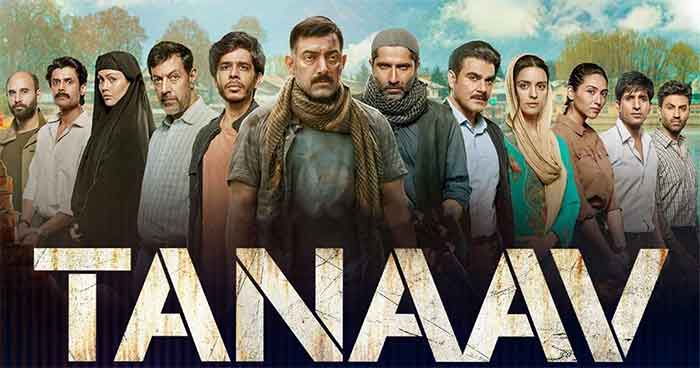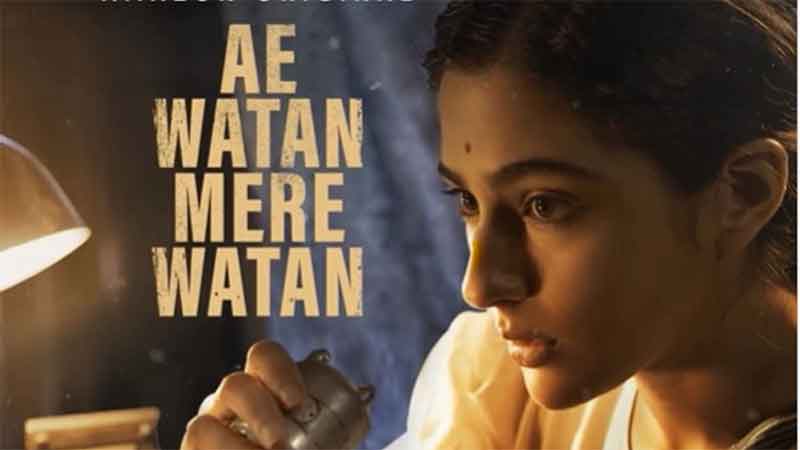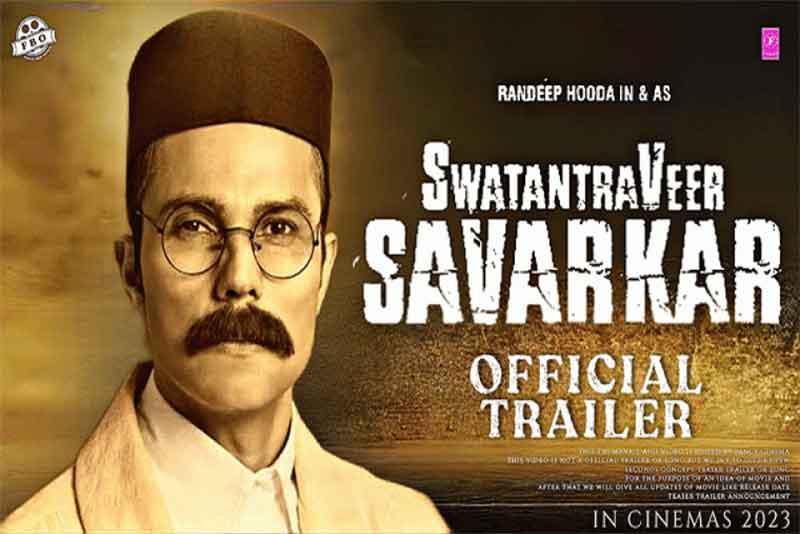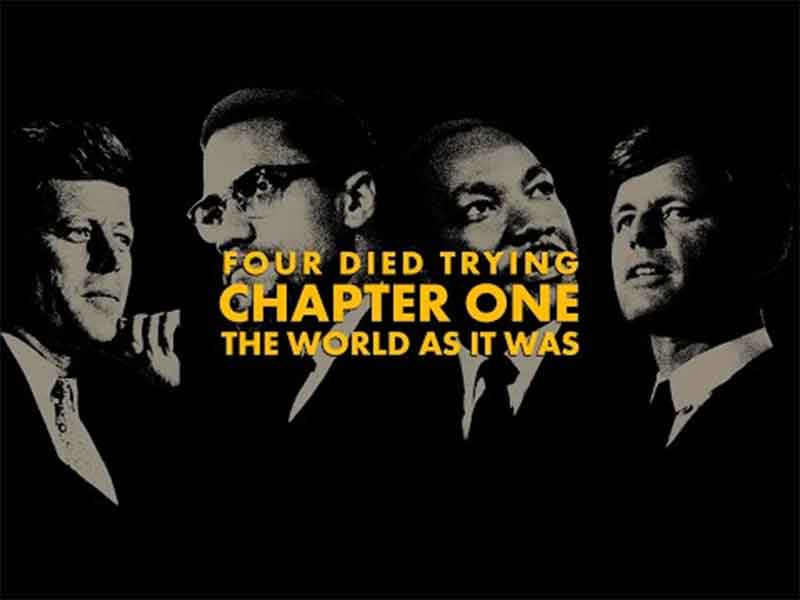Tanaav, a series, that released on an online platform, last month, tells a tale of human conflict. It is the tale within the tale that is worrying.

Last month India’s International Film Festival, held annually in Goa, brought together quality cinema, film-makers and audiences, to a celebration of how to speak truth to power, and say it well. The Golden Peacock (Best film), was won by the Spanish language film, I have electric dreams, made by a Costa Rican director, and the Silver Peacock (Runner-up) by the Iranian film, No End. (https://pib.gov.in/PressReleasePage.aspx?PRID=1879662). Not many people will know this, for the Festival will forever be remembered, for the Jury Chair’s visceral, comments, of one film-maker’s lack of subtlety in telling a story. (Indian Panorama, (https://pib.gov.in/PressReleasePage.aspx?PRID=1870193). (I haven’t seen it, so can’t comment on the film or the comments on the film). Predictably, there was blowback, with the jury head, getting trolled viciously, as he narrated in an interview that aired (The interview, Karan Thapar) on a web platform the next day. It got so bad, with potential consequences for the trade relationship that the Israel’s Ambassador to India, publicly apologized.
The Israel, India cultural partnership had been underlined, by Minister Anurag Thakur, choosing to spotlight the Israeli thriller, Fauda, while inaugurating the IFFI. Fauda, has won admiration, for realistic portrayals, (https://www.khaleejtimes.com/entertainment/exclusive-fauda-became-a-bridge-between-arabs-jews) as also brickbats, for stereotyping Palestinians, (https://www.haaretz.com/israel-news/2020-04-24/ty-article-opinion/.premium/fauda-isnt-just-ignorant-dishonest-and-absurd-its-anti-palestinian-incitement/0000017f-e20e-d804-ad7f-f3fe44720000). Thakur’s speech moved, Tanaav, the culturally adapted official remake of that globally acclaimed series, from the entertainment pages, to the news pages.
The Indian version, effectively transplants the series, to Kashmir. Tanaav, (https://en.wikipedia.org/wiki/Tanaav), portrays the conflict, between a resistance movement that is being held up by the dreams, and nightmares, of a people, and the might of the Indian State, the guns, jeeps, and Kashmiri-speaking special forces, trying to uphold a set of nationally accepted values, and interests. “We are Indians, we don’t do that,” a senior officer, says to a field operative, wanting to pick up hostages, to force the hand of Umar Riaz aka Panther, planning an operation, to rival New York’s 9/11 and Mumbai’s 26/11. For Panther, the murder of his own people is a worthy sacrifice to instill fear, and demonstrate to the State, that it is powerless. To provoke a reaction that will force the world to pay attention, to a cause that it no longer pays attention to.
It is not new, for entertainment industry to work closely with a political side, telling an ideological tale and telling it well, enough to convince audiences, and make a lot of money too. In most cases, those stories are told out of genuine commitment and an eye on the box office. From Kismat, (speaking for the popular anti-British voices, in the pre-Independence era) to post Independence’s Naya Daur, to Amar Akbar Anthony, to Mission Kashmir, Bollywood, has told the story of India’s Constitution, with panache.
Arc Of Change
India’s new political establishment has also chosen the entertainment industry to tell its stories with varying results. Earlier this year, some state governments had to sacrifice precious revenue, (https://www.hindustantimes.com/india-news/the-kashmir-files-list-of-states-which-have-declared-the-film-taxfree-101647344856004.html) while others, had to dip into private funds, book entire shows, to ensure audiences for a film, (https://timesofindia.indiatimes.com/city/mumbai/bjp-neta-books-entire-kashmir-files-show-for-ward-residents/articleshow/90314069.cms) that told a tale, they wanted watched.
With Tanaav, Indian film-making, tells the story right. Early in the series, we meet the young, Fatima, the love of her life, killed by a stray bullet, aimed at her to-be-brother-in-law, Umar Riaz. Angry, rudderless, seeking justice, revenge Fatima, reaches out to the “movement”, wanting an opportunity to make a statement. Initially sent away, she is recruited, by a perceptive operative with a clipped accent, who points out, she’s angry, if we don’t use her, someone else will. And so they do.
Main Cappucino order karun? It is a question young women, tentative in a new relationship will identify with. Only Fatima, is asking the question of her British-born handler Khalid, who is an important cog of the wheel that is the “movement’ as they sit outside an upscale café, which could be well in any global city. In her hands, Fatima, is holding a camera, retrofitted to be a bomb. Khalid gives precise instructions, once you press the shutter you will have only two minutes, to leave. Unsaid, he is giving her a choice. A few minutes later, a waiter asks Fatima, Almond milk? She nods her no. As she looks around, the café is full of people just like her or what she was — unwinding after a long workday, a gaggle of young professional men, their closely cropped hair, giving away their profession, families with small children, out for an evening snack, a sound makes her look down; in front of her is a cappuccino, with the froth, shaped like a heart.
In the darkened car, Khalid’s mobile phone pings. The bomb has been activated. As the seconds tick by, he waits. You will too. You know what’s coming, but you hope. He drives away, and tomorrow’s headlines blow up on the screen.
This is the story the State wants to be told of rage, fuelled by geopolitics that destroys, the innocents.
Seeing Like the State
What makes, Tanaav, important, are its nuances. The series, tells well the story of a national security state that attempts to be human, and yet continually turns its own against itself. Zainab Riaz, is an Indian citizen, whose world revolves around family, husband, Umar Riaz, fighting what he considers the good fight against the Indian State, children Aafiya and Abrar, and in-laws. She doesn’t oppose her husband’s politics, nor does she support it, just as she doesn’t help the State’s agents, nor does she oppose them. Her everyday is uneventful, no different from that of homemakers, anywhere else in India. When her husband, sets off a bomb, that almost blinds, her daughter, she turns to the State for assistance, accepting better quality medical support from the Indian Army’s doctors. She does this combating stiff opposition from her in-laws, who see it as a betrayal. So far, we are still in Mission Kashmir, Mission Possible territory.
Only in Tanaav’s telling, the State does not stop there. What the State’s representative does next, generates an understandable disgust, in Zainab, and repels the viewer.
Citizen Zainab began her journey with ambivalent loyalties, wife of a mass murderer, her brother-in-law, killed by a stray bullet minutes before he was to say kabool hai and marrying the love of his life, Fatima. On seeing herself through the State’s eyes, only as Panther’s widow, Zainab, grabs an oversized teddy bear, from her protesting daughter’s arms, briskly walking over to the garbage bin, chucking it in. That bear had been a gift from Malik Sahab, representative of that same State. Alongwith the bear, he had also given her passports, and one way air-tickets, making it clear, she and her children need to leave their home and never return.
Our NowStory
A month before the IFFI, the New Yorker, carried journalist Samanth Subramanian’s investigation into the entertainment industry’s negotiations with the State, aptly titled, When the Hindu Right came for Bollywood, (https://www.newyorker.com/magazine/2022/10/17/when-the-hindu-right-came-for-bollywood). While Subramanian tracks the ebb and flow of money, and ideology, in a sign of the times, he chooses to lede the article, with what happened after a “cheesy TV show”, Tandav was aired on an OTT platform. Tandav, is a tedious telling, of a familiar story, Kauravas, and Pandavas, fighting elections, set somewhere, in the Hindi heartland. One of the Kauravas has shades of saffron. The Supreme Court, just last week, confirmed the anticipatory bail of the platform’s head of content (https://www.livelaw.in/top-stories/tandav-webseries-row-supreme-court-grants-anticipatory-bail-to-amazon-prime-video-india-head-216361) who green lighted the series, that was aired and forgotten in 2021.
Silencing is only part of the plan. There is also the active promotion of a point of view. Looking to avert the planned catastrophe by an officially dead and yet alive mass murderer Malik Sahab, walks across the bridge over a river, into another’s territory, no documents checked, to be greeted as a welcome friend, by another Malik Saheb. Jagjit Malik, an Indian intelligence officer, operating in the grey zone, between friends and enemies, is one of the better etched characters, and played effectively by actor Rajat Kapoor, (https://www.cnbctv18.com/entertainment/rajat-kapoor-i-dont-do-much-preparation-im-not-that-kind-of-an-actor-15152021.htm). Learning, that Umar Riaz, aka Panther, an agent of the other side, has gone rogue, he walks back, over the same bridge, a more worried man. The bridge that keeps the two sides closer than the noise of the conflict on the ground, suggests.
All over the world, streaming services have emerged as a new source of revenue, for the entertainment industry. When streaming services, arrived in India, they arrived with a shift in the political establishment. For Bollywood, struggling, with rising costs, shrinking of the traditional single screen market, and Covid lockdowns, seeing like the state, is not just ideologically convenient it can change the ink on a balance sheet, from red to black.
Vijayalakshmi Balakrishnan is author of Growing Up And Away, Narratives of Indian Childhoods (OUP). Email: [email protected]

















































